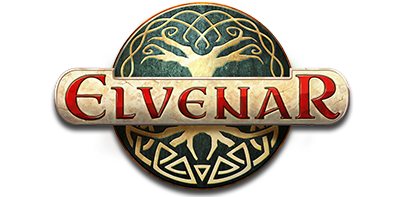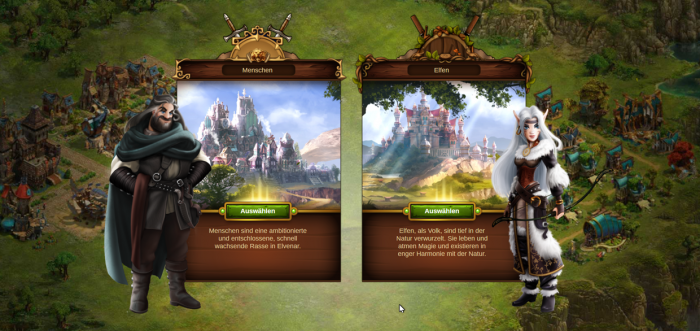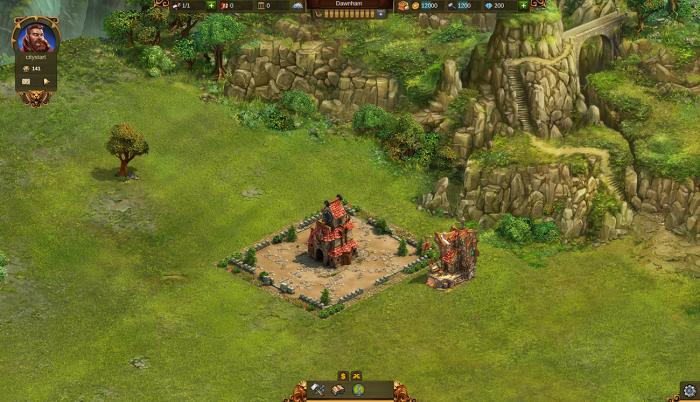Grundlagen
Völker
Gleich nachdem du dein Konto eingerichtet und dich in eine Welt (= Spielserver) eingeloggt hast, musst du dich entscheiden, ob du die Menschen oder die Elfen spielen möchtest.
Beide Völker spielen sich recht ähnlich, aber von deiner Wahl hängen ein paar wesentliche Faktoren ab, in denen sich das Spiel anschließend unterscheidet:
- Das Aussehen deiner Stadt hängt von dem Volk ab, das du gewählt hast. Elfen sind magiebegabte Wesen, die in Verbundenheit mit der Natur leben. Dies drückt sich auch im filigranen Design ihrer Gebäude aus. Menschen hingegen sind ehrgeizig und zielstrebig. Ihre Bauwerke sind eher mittelalterlich-industriell geprägt.
- Die militärischen Einheiten, die dir zur Verfügung stehen, unterscheiden sich ebenfalls. Zum Beispiel verlassen sich Elfen u.a. auf mächtige, baumartige „Treants“, während man bei den Menschen u.a. klassische Axtkämpfer findet.
Sobald eine weitere Welt (Server) bei Elvenar gestartet wird, hast du die Möglichkeit auch das andere Volk auszuprobieren.
Stadtkarte
Zu Beginn ist der verfügbare Baugrund, auf dem du deine Stadt errichten kannst, begrenzt. Die Stadtkarte ist in verschiedene “Kacheln” unterteilt, die wie ein Rasternetz angeordnet sind und auf denen du die ersten Gebäude errichten kannst, um mit dem Aufbau deiner Stadt zu beginnen. Du beginnst mit 15x10 Kacheln.
Natürlich möchtest du deine Stadt vergrößern und eine der Herausforderungen besteht darin, den vorhandenen Bauplatz bestmöglich auszunutzen. Um mehr bebaubare Fläche zur Verfügung zu haben, kannst du sogenannte „Erweiterungen“ erhalten, indem du sie entweder im Forschungsmenu freischaltest, durch das Lösen aller Begegnungen in einer Provinz als Belohnung erhältst oder sie für Premium erwirbst. Jede platzierte Erweiterung fügt deiner Stadt eine Baufläche in der Größe von 5x5 (= 25) Kacheln hinzu.
Zwei Gebäude stehen zu Anfang bereits in deiner Stadt: Das Hauptgebäude und die Baumeisterhütte.
- Das Hauptgebäude ist der Mittelpunkt der Stadt und dient zusätzlich als Lagerstätte für Münzen, Vorräte und Güter. Die meisten Gebäude müssen mit einer Straße an das Hauptgebäude angeschlossen werden, damit sie ihre Arbeit aufnehmen können.
- In der Baumeisterhütte wohnen deine Arbeiter. Diese errichten Gebäude und bauen sie weiter aus. Hier kannst du auch deine aktuellen Bauvorhaben verwalten.
Basic Resources
There are two basic resources in Elvenar, which will help you to grow up your city:
- Coins: Coins are produced automatically over time from Residences.
- Supplies: To produce Supplies you need to place an order in the Workshop. Each type of production requires a different length of time.
First steps

At the beginning of the game you should be aware of three things:
First, you can’t have a town without inhabitants (population). When you start building up your town, you should build a couple of Residences first. They ensure you have available population and generate Coins income. Most buildings you will want to build require inhabitants who can work in those buildings, and the construction costs consist mostly of Coins, which your Residences will generate. It is recommended you build at least eight Residences at the beginning. They are cheap and constructed in no time. Just don’t forget to connect them to the Main Hall using streets.
Secondly, you need to produce Supplies as soon as you have your Residences built. They are a very valuable resource used to construct certain buildings, and later also to produce Goods and to train your battle units. Supplies can be produced in Workshops, so it is recommended you build at least three of these as soon as you have a few Residences. With enough Coins and Supplies, your core economy is already in place and running smoothly.
And third, you will need Cultural Buildings in your town. This will allow you to upgrade other buildings and keep your population producing at maximum efficiency. Your city space is limited and always will be. So, upgrading buildings to improve their properties is key to make the most out of the space you have available. To upgrade, you will need many Coins and Supplies as well as inhabitants and Culture. Therefore, In order to advance your town, always make sure you have an adequate Culture surplus.
If you have more available Culture than required for upgrades, your citizens will be happier and will produce more efficiently. To a certain extent, this will be the cheapest way to earn more Coins and Supplies. Just don’t overdo it! It doesn’t make sense to have a town full of Cultural Buildings but no Residences to live in.
Now that your city is flourishing, it is a good time to go onto the World Map where you can scout a few Provinces and start collecting Relics. Relics will become useful very soon. Every time you receive a Relic, you will also receive a “Knowledge Point”. Don’t forget to spend those points regularly in the Research Tree. This will unlock new buildings and other things that will help your city to progress.
And one last bit of advice for beginners: Listen to your advisors! If you complete quests regularly, you will be generously rewarded, and it will be easy for you to proceed and advance in the game.


